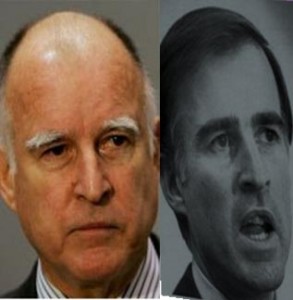Is This Any Way to Run a City’s Schools?
Leaked CTU Proposals Won’t Do Anything to Improve Schools’ Poor Performance
 It’s not often that a politician has to deal with a problem he created nearly twenty-five years ago.
It’s not often that a politician has to deal with a problem he created nearly twenty-five years ago.
Most politicians sacrifice the short-term political benefit and leave the political headache to future generations of taxpayers and politicians. That’s why it is ironic that while Jerry Brown wrestles with a spending and debt crisis in California he is forced to deal with a problem of his own making.
In 1976, during Brown’s first term as governor, he approved collective bargaining rights for government workers. Since that decision, the government workers unions power and influence have grown California’s government spending through the roof as they bargained against the taxpayers for greater salary and benefits that many of their private sector counterparts.
One thing you can say about Jerry Brown is that politics runs through his veins. Since 1976, Brown has been defeated for re-election, run for the presidency, elected mayor of a large city and won the governorship again forcing him to deal with a $16 billion deficits and a powerful opposition for reform from government union bosses — union bosses empowered by his 1976 decision.
Brown’s solution to this problem shows that while he may have extraordinary staying power he has underwhelming temerity. While he talks about taking on the special interests and making drastic cuts to the state’s budget, he is offering large tax increases and minor reforms to the power of the unions. Should the state defeat his tax increase initiative this November, he will be forced to take on the monster of his own making. Don’t count on Jerry Brown asking that California become a Right to Work state but it would be a sign that he was serious in addressing the problem of his own making.
Chriss Street at Breitbart looks at this problem in greater detail:
With California’s financial condition in free fall, ultra union friendly Governor Jerry Brown demanded public-employee unions cut compensation by 10%. If the People’s Republic of California is adopting fiscal responsibility, perhaps America can too.
For unions, Jerry Brown has been the governor who always kept on giving. In 1976 he approved collective bargaining for California government workers. Last November he signed SB 922, protecting “project labor agreements” that force non-union workers to apply for union membership, and pay dues, in order to work on public projects. While predicting a $9.2 billion budget deficit in January, Brown sought to protect public service union jobs by cajoling private sector retailers to support a voter initiative to raise sales taxes. Brown focused on raising $630,000 in contributions for his tax increase initiative from unions, Indian tribes, and crony capitalists.
Brown’s good-old-boy support for his union brothers and sisters may have come to a screeching halt as California State Controller John Chaing published a devastating April Financial Statement showing monthly income, sales and corporate tax revenue came in 20.2% below the governor’s latest projections and sales tax collections fell by an astounding 61% below last year.
Looking closer into the numbers, California missed the national economic recovery.
As U.S. Gross Domestic Product grew by 2.2%, California employment grew by only 1.3%. Given that the workforce expands by 1.5% annually as more young people begin looking for jobs; this explains why California unemployment rose to 11% last month as U.S. unemployment fell to 8.1%. Chiang ominously stated: “Without a timely, financeable budget plan, the State will be unable to access the working capital needed to pay its bills later this year.”
This is bureaucratic speak for: We are insolvent, our credit rating should be junk and we will default when we can’t borrow any more money!
California rolled over an $8.2 billion deficit from last year’s budget disaster and this year’s growing deficit has forced the state to increase borrow another $7.7 billion. Although the state did cut $1.8 billion or 8% from operations and school funding was flat this year; spending on health and human services jumped by a stunning $3.7 billion or 6.2%.
Jerry Brown has been the strongest ally of public sector unions. Chief Executive Magazine’s survey of best and worst states for business ranks California dead last. According to one CEO: “The leadership of California has done everything in its power to kill manufacturing jobs in this state. As I stated at our annual meeting, if we could grow our crops in Reno, we’d move our plants tomorrow.”
Given that high taxes and onerous regulatory enforcement was championed by Brown in California and then spread out across the nation; Brown is best positioned to unwind these job killers. When Jerry Brown told state employee union leaders his next budget would include a 10% cuts in state worker compensation, there has been little opposition. Perhaps California’s financial distress may require Jerry Brown to be America’s pro-business governor.

Leaked CTU Proposals Won’t Do Anything to Improve Schools’ Poor Performance

Wherever Big Labor wields the power to collect forced union dues, union bosses funnel a large share of the confiscated money into efforts to elect and reelect business-bashing politicians. Employment growth tends to lag as a consequence.

Josh Hawley distances himself from pro-Right to Work pledges, aligning with union bosses like the Teamsters, despite their history of corruption.